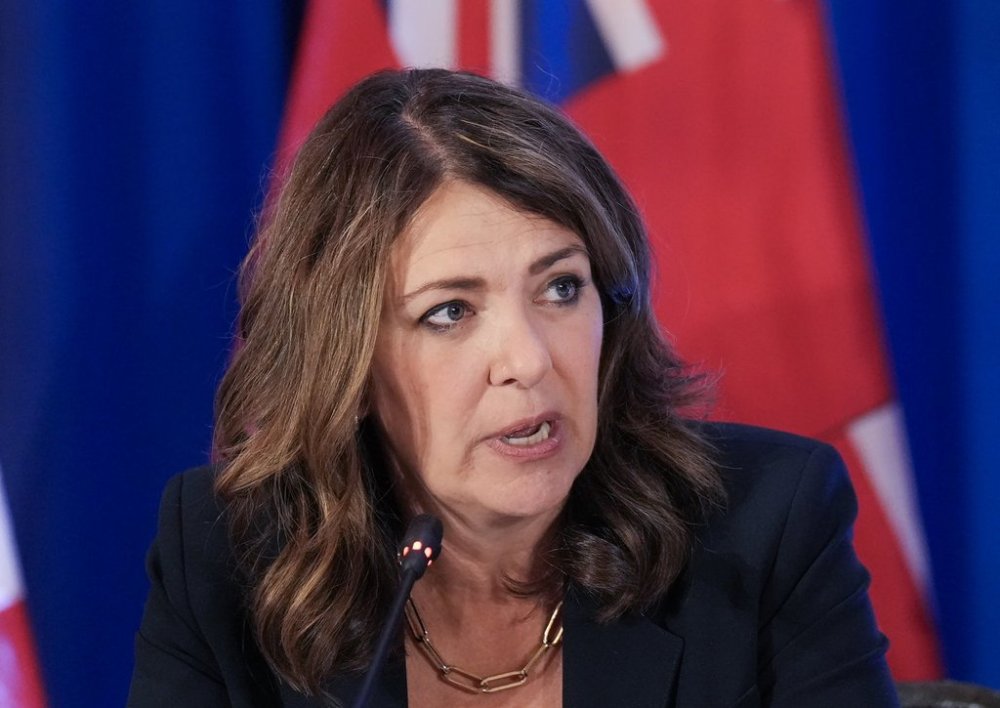Alberta premier defends possible use of notwithstanding clause on transgender issues
Advertisement
Read this article for free:
or
Already have an account? Log in here »
To continue reading, please subscribe:
Monthly Digital Subscription
$0 for the first 4 weeks*
- Enjoy unlimited reading on winnipegfreepress.com
- Read the E-Edition, our digital replica newspaper
- Access News Break, our award-winning app
- Play interactive puzzles
*No charge for 4 weeks then price increases to the regular rate of $19.00 plus GST every four weeks. Offer available to new and qualified returning subscribers only. Cancel any time.
Monthly Digital Subscription
$4.75/week*
- Enjoy unlimited reading on winnipegfreepress.com
- Read the E-Edition, our digital replica newspaper
- Access News Break, our award-winning app
- Play interactive puzzles
*Billed as $19 plus GST every four weeks. Cancel any time.
To continue reading, please subscribe:
Add Free Press access to your Brandon Sun subscription for only an additional
$1 for the first 4 weeks*
*Your next subscription payment will increase by $1.00 and you will be charged $16.99 plus GST for four weeks. After four weeks, your payment will increase to $23.99 plus GST every four weeks.
Read unlimited articles for free today:
or
Already have an account? Log in here »
EDMONTON – Alberta’s premier says her government might invoke the notwithstanding clause to defend laws affecting transgender people because courts may take “years and years and years” to resolve the issue, and she wants to “protect kids.”
Smith, who made the comments Saturday on her provincewide radio call-in program, was responding to news that an internal memo from her government, obtained by The Canadian Press, says it plans to apply the clause this fall to its three laws that police school pronouns, female sports and gender-affirming health care.
The government’s memo says it plans is to bring the notwithstanding clause proposal to cabinet Oct. 21.

“I’m prepared to go to court and battle it out. I think we need to. But if it turns out that the court process may take years and years and years to resolve, then we may have to take that measure in order to protect kids,” Smith said, noting government lawyers are looking into it and a decision hasn’t yet been made.
“Puberty blockers, by definition, stop the process of sexual maturity and it means that you’re sterilizing children, and we’re not going to do it.”
The government passed a law late last year, but not fully in effect, which bans doctors from providing treatment such as puberty blockers and hormone therapy to those under 16.
LGBTQ+ advocacy groups Egale and Skipping Stone, along with five gender-diverse youth and their families, have launched legal a legal challenge against the law and it is currently subject to a temporary court-ordered injunction. Alberta is appealing, arguing the injunction was premature.
Puberty blockers are given by injection to youth experiencing gender dysphoria, where a person’s gender identity does not match the sex they were assigned at birth. The medications block physical changes such as breast development due to estrogen or a deepening voice from testosterone, and allow youth time to decide if they want to continue gender-affirming surgeries.
According to the Mayo Clinic website the medicine most often used for blocking puberty, gonadotropin-releasing hormone (GnRH) analogues, don’t cause permanent physical changes. The site says when a person stops taking GnRH analogues, puberty starts again.
When granting the temporary injunction in June, Justice Allison Kuntz wrote that denying treatment risks causing youth emotional harm and exposing them to permanent physical changes that don’t match their gender identity.
The notwithstanding clause allows governments to override certain sections of the Charter of Rights and Freedoms for up to five years. Smith has long downplayed a need to use it, although last December she said it could be used as a last resort to shield the health restrictions law.
She appeared to dismiss the importance of the government memo when speaking about it on the radio Saturday.
“First of all, it’s a leaked memo, so obviously somebody’s upset about it, and so they’re trying to make a media story out of it,” she said, stressing children shouldn’t be making such health decisions.
“If we don’t think a 10-year-old can decide to sign a contract, to smoke, to join the army, to do drugs, to be truant from school, then they can’t decide whether or not they want to have babies as an adult.”
The Canadian Medical Association and three Alberta-based doctors are also challenging the health law in a separate case launched in May. They argue the law violates a doctor’s right to freedom of conscience.
This report by The Canadian Press was first published Sept. 20, 2025.

